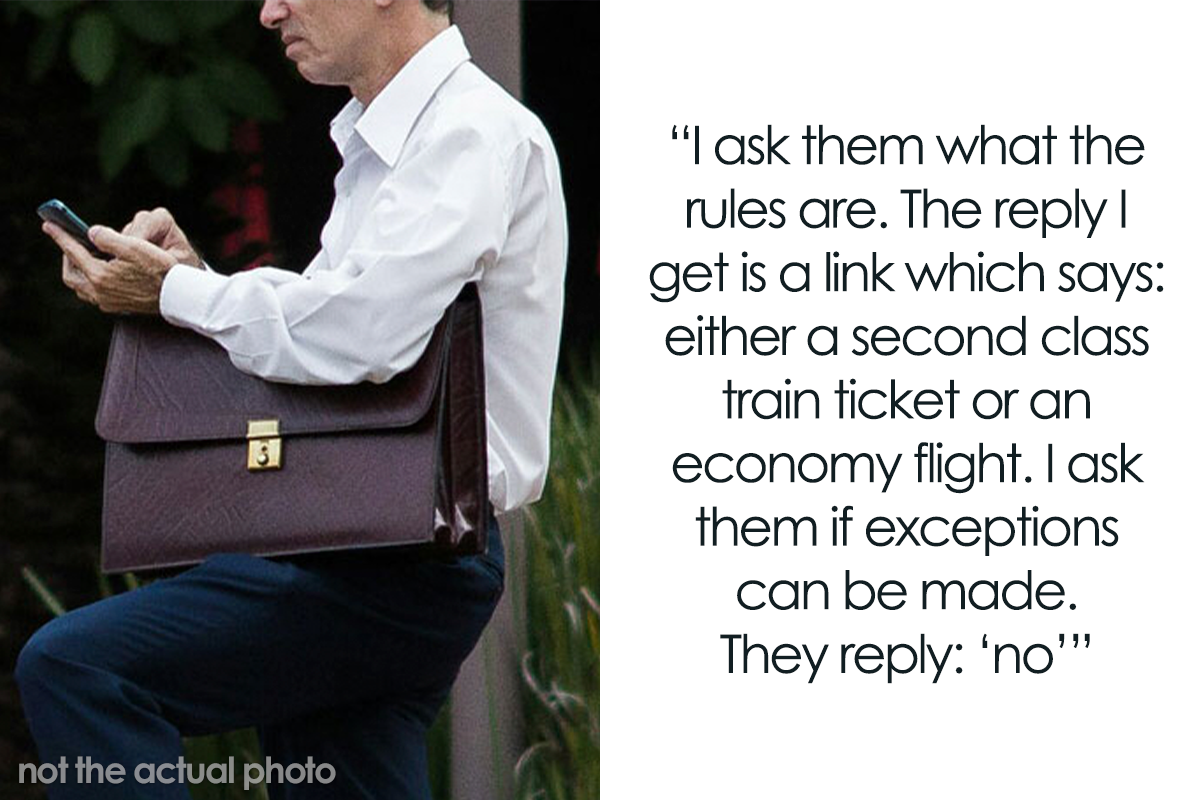
Guy Maliciously Complies After Company Demands He Take Economy-Class Plane Instead Of 1st-Class Train
No one knows where the practice of cutting costs came from in business – even in quite prosperous companies. But be that as it may, even if the company has just made the biggest profit in its history, there will definitely be a manager who will offer to save on something.
For example, on travel expenses for employees, even very important ones. It happens when you have to travel regularly between several cities – and why waste money on trifles if you bring a lot of money to the organization? But still, cutting costs is cutting costs, maybe just “because everyone is doing it”.
But sometimes such pettiness is punished. As in the case of this Redditor, whose Malicious Compliance community post has garnered nearly 10K upvotes as of today and over 300 people have commented on it.
More info: Reddit
The Original Poster had to travel a lot between Brussels and Frankfurt on business purposes
Image credits: Tejvan Pettinger (not the actual image)
So this was about fifteen years ago, when the Original Poster was based in Brussels and their company had a headquarters in Frankfurt, so the OP had to travel there periodically. The cities are about 200 miles (320 kilometers) apart, so there were three transportation options: car, train, and plane.
Image credits: u/Finniemc
They used to go by train, especially first class as the difference in ticket prices was not so big
The management warned the OP in advance that it was better not to use their car, because it would be too expensive to pay per km. Therefore, the author of the post usually traveled by high-speed train. Second class as usual – however, after one trip, when a mother with a baby suddenly appeared in their booked place, flatly refusing to leave it, so the OP had to stand up for the entire trip, they decided to go first.
Image credits: u/Finniemc
One day the OP received a letter from HR stating that they were violating company rules
Moreover, the difference between the cost of tickets in different classes was not very big – around 20 euro. In general, for almost a year, the OP traveled between cities by first class, and one fine day they received an unexpected letter from the HR department. The letter stated that they were violating company policy, so the company would not refund travel expenses for first-class tickets.
Image credits: Frankie Roberto (not the actual image)
The OP was surprised and decided to clarify about the rules. As it turned out, the rule was – either the second-class train, or the economy flight. The Original Poster asked if they could make some exception, but received a strict refusal.
Image credits: u/Finniemc
The OP made their next travel with an economy flight, but it cost about 5 times more than the first-class tickets
Not a problem, the OP decided, and the next time they flew to Frankfurt by plane. The only problem was that flights between Brussels (the capital of the EU) and Frankfurt (one of the banking capitals of Europe) were incredibly expensive. On top of that, the OP, in full compliance with corporate rules, also included the transportation costs per km on driving their car to and from the airport – and S-bahn trips in Frankfurt as well.
Image credits: u/Finniemc
The result was an amount about five times more than that they usually spent on first-class train tickets. Needless to say, about a week later, the OP was granted the same exception that had been so sharply denied earlier.
Image credits: Isabelle Abrego (not the actual image)
Commenters on Reddit were mostly delighted with the OP’s witty decision
People in the comments mostly admired the OP’s witty decision, although some pointed out that they could have taken the cheaper tram instead of the S-Bahn in Frankfurt. However, it is possible that they simply once worked in company management themselves and thought just in terms of frugality.
It is interesting that such cases were not isolated as the commenters cited at least three similar situations that happened to themselves or to acquaintances, and in various countries. And the most remarkable thing is that the OP added that since then, a special provision for “choosing an option that is cheaper for the organization” has appeared in the rules of their company.
By the way, this article also has one “corporate rule” – you should either leave your comment or tell a similar story. Just choose the option which is more convenient for you. 😉
I have a similar story. My employer would occasionally require me to work in another office about 100 miles away from my regular office. The cheapest way to get there was by rail, but the rail system did not have any way to provide receipts to show proof of payment for the travel. I tried to get an exception on my expense account so I would be reimbursed for the trip by rail, but was denied: no receipt, no reimbursement. Ironically, reimbursement for travel by personal car did not require any documentation (I guess they figured that since you got there somehow, they would assume you drove). The reimbursement rate for driving was about 6-8 times the cost of rail. Consequently, I would travel by rail and submit a travel reimbursement based on the driving rate.
Good idea, especially if the train is faster than driving. If you dont have a car, though, be careful you dont get found out; they could deny you reimbursement due to fraud, or ask you to reimburse *them* for the money they paid you. They might even fire you.
Load More Replies...I too have a corporate idiocy story. Several years ago my VP told me to get on a plane from the US to France immediately to figure out a manufacturing issue at a plant we worked with. I booked a business class ticket on British Airways (biz class was permitted for overseas flights), but as a last minute ticket it was very expensive. I then asked our administrative assistant to look for something lower. She found a United flight in first class that was $2k lower due to discounts my company got with United. Great...we told our VP I'd be in first class as per the rules and it was set. A few weeks after returning, I started getting calls from the accounting department saying I violated the rules by flying first class...the first couple of times I referred the caller to my VP who said he did allow it The 3rd call was too much...finally I asked: if I had taken the British Air flight for $2k more, would we be having this conversation? She answered no and I never heard back from them.
re: that comment about taxi drivers, I once had a taxi driver give me a whole stack of blank receipts, I saved them and used them for reimbursement when my wife drove me to the airport. (and the reimbursement amount was still less than what the company would have reimbursed for me to drive myself to the airport and park for a few days)
I once had to fly across the U.S. for a conference, and since I was already out and about, looked at timing and fares to see if my already being in the general area ( in broad thinking) would allow me to piggy-back on a visit to an old college friend at not too much additional expense, and I of course would personally pay for any increase in flight cost. I was really surprised, must have been dates or which airport, but the original cost for home-conference-home cheapest was $X, and the cost of home-conference-friend-home was $X minus $150! So, I printed out both price screens (thankfully!), booked the trip, and submitted for reimbursement, and included a sidebar that the personal days loop was $150 cheaper. I STILL received three calls from the bean-clerks, smuggly saying I had to pay the ticket difference, to which I kept replying, "well, if you insist, then add $150 for me to my voucher request". Two calls were after I sent along copies of the detail screens.
Many moons ago I worked a position at Wal-Mart that required travel. And of course mileage, hotel and meals were compensated. So for the daily per diem, I'd buy groceries AT WALMART not exceeding the limit. I was called out that I needed to adhere to the spirit and from that point forward I spent that money elsewhere and ate like a king.
Have made the trip by train a few times, I'd take the flight everytime. Those German train stations are just awful.
This is not maliciously complying. This is sticking up for yourself.
'Maliciously Comply' simply means doing your job in a way that is completely within the rules, but demonstrates the foolishness of those rules. This situation fits perfectly.
Load More Replies...the layout of this article is terrible. the story itself is written well,but all the mansplaining around it to avoid a plagiarism charge is pitiful.
I was once told my company doesn't HAVE to pay anything in advance (I requested a travel advance) and I should be less pushy because I will get the money back anyways so what's my problem. We paid everything but the plane tickets by ourselves. I needed to stay for a MONTH in a hotel in one of the most expensive cities in Europe in high season. The hotel itself would cost over 2 times my monthly salary.
I'm just here to point out that they censored the word @n@l in the first person's reply in post to OP. In can you missed it. They censored ana|.
My husband and I work for a humanitarian agency and the travel policies specify that we need to either book with their travel agency or directly from the travel company (Air Canada...). But the travel agency uses a 3rd party and I've told our agency repeatedly that I can get much better prices than either. Denied. Pre-Covid we used to travel every week and in a month I could have saved them thousands of dollars. Multiple by a year or two...
This "article" could have just been a link to the Reddit post. Nothing of value was added to it. This reads like a fourth grader's book report.
I have a similar story. My employer would occasionally require me to work in another office about 100 miles away from my regular office. The cheapest way to get there was by rail, but the rail system did not have any way to provide receipts to show proof of payment for the travel. I tried to get an exception on my expense account so I would be reimbursed for the trip by rail, but was denied: no receipt, no reimbursement. Ironically, reimbursement for travel by personal car did not require any documentation (I guess they figured that since you got there somehow, they would assume you drove). The reimbursement rate for driving was about 6-8 times the cost of rail. Consequently, I would travel by rail and submit a travel reimbursement based on the driving rate.
Good idea, especially if the train is faster than driving. If you dont have a car, though, be careful you dont get found out; they could deny you reimbursement due to fraud, or ask you to reimburse *them* for the money they paid you. They might even fire you.
Load More Replies...I too have a corporate idiocy story. Several years ago my VP told me to get on a plane from the US to France immediately to figure out a manufacturing issue at a plant we worked with. I booked a business class ticket on British Airways (biz class was permitted for overseas flights), but as a last minute ticket it was very expensive. I then asked our administrative assistant to look for something lower. She found a United flight in first class that was $2k lower due to discounts my company got with United. Great...we told our VP I'd be in first class as per the rules and it was set. A few weeks after returning, I started getting calls from the accounting department saying I violated the rules by flying first class...the first couple of times I referred the caller to my VP who said he did allow it The 3rd call was too much...finally I asked: if I had taken the British Air flight for $2k more, would we be having this conversation? She answered no and I never heard back from them.
re: that comment about taxi drivers, I once had a taxi driver give me a whole stack of blank receipts, I saved them and used them for reimbursement when my wife drove me to the airport. (and the reimbursement amount was still less than what the company would have reimbursed for me to drive myself to the airport and park for a few days)
I once had to fly across the U.S. for a conference, and since I was already out and about, looked at timing and fares to see if my already being in the general area ( in broad thinking) would allow me to piggy-back on a visit to an old college friend at not too much additional expense, and I of course would personally pay for any increase in flight cost. I was really surprised, must have been dates or which airport, but the original cost for home-conference-home cheapest was $X, and the cost of home-conference-friend-home was $X minus $150! So, I printed out both price screens (thankfully!), booked the trip, and submitted for reimbursement, and included a sidebar that the personal days loop was $150 cheaper. I STILL received three calls from the bean-clerks, smuggly saying I had to pay the ticket difference, to which I kept replying, "well, if you insist, then add $150 for me to my voucher request". Two calls were after I sent along copies of the detail screens.
Many moons ago I worked a position at Wal-Mart that required travel. And of course mileage, hotel and meals were compensated. So for the daily per diem, I'd buy groceries AT WALMART not exceeding the limit. I was called out that I needed to adhere to the spirit and from that point forward I spent that money elsewhere and ate like a king.
Have made the trip by train a few times, I'd take the flight everytime. Those German train stations are just awful.
This is not maliciously complying. This is sticking up for yourself.
'Maliciously Comply' simply means doing your job in a way that is completely within the rules, but demonstrates the foolishness of those rules. This situation fits perfectly.
Load More Replies...the layout of this article is terrible. the story itself is written well,but all the mansplaining around it to avoid a plagiarism charge is pitiful.
I was once told my company doesn't HAVE to pay anything in advance (I requested a travel advance) and I should be less pushy because I will get the money back anyways so what's my problem. We paid everything but the plane tickets by ourselves. I needed to stay for a MONTH in a hotel in one of the most expensive cities in Europe in high season. The hotel itself would cost over 2 times my monthly salary.
I'm just here to point out that they censored the word @n@l in the first person's reply in post to OP. In can you missed it. They censored ana|.
My husband and I work for a humanitarian agency and the travel policies specify that we need to either book with their travel agency or directly from the travel company (Air Canada...). But the travel agency uses a 3rd party and I've told our agency repeatedly that I can get much better prices than either. Denied. Pre-Covid we used to travel every week and in a month I could have saved them thousands of dollars. Multiple by a year or two...
This "article" could have just been a link to the Reddit post. Nothing of value was added to it. This reads like a fourth grader's book report.


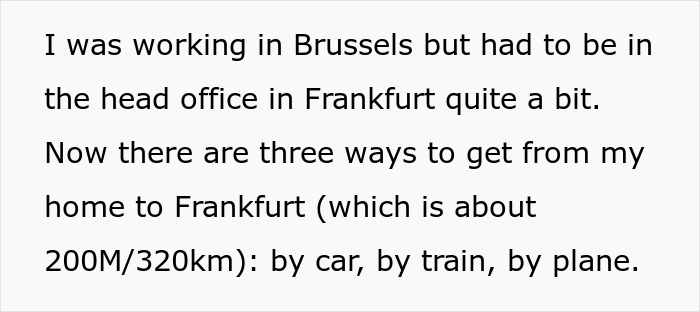

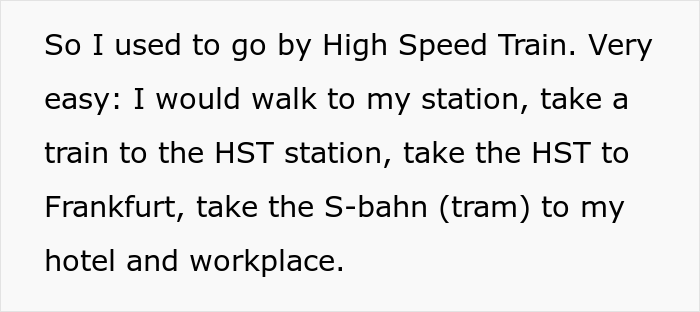
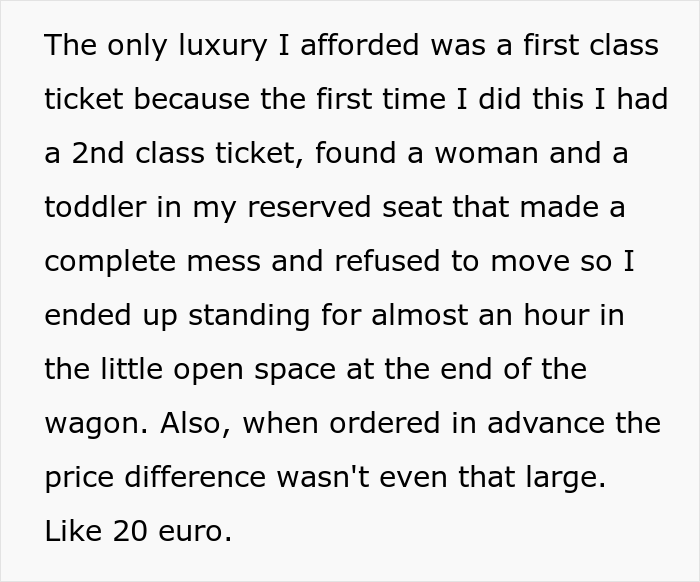
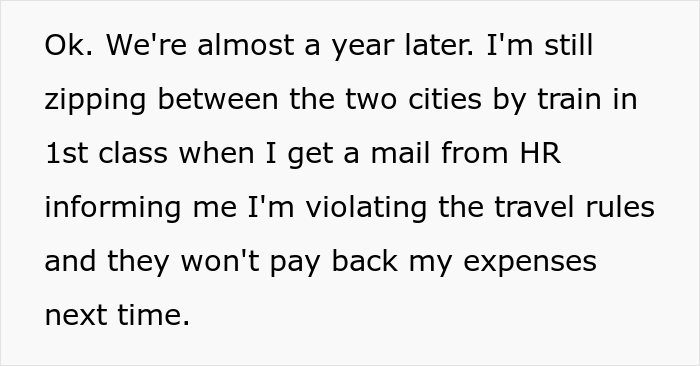
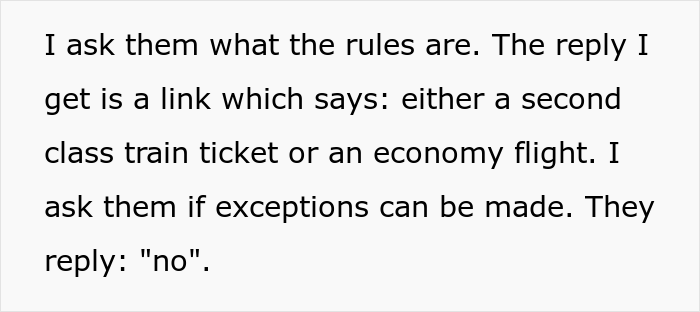

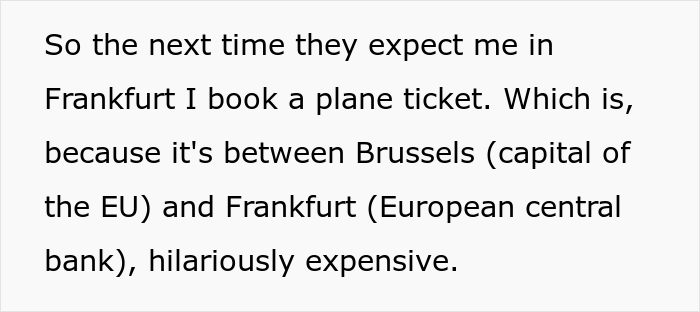
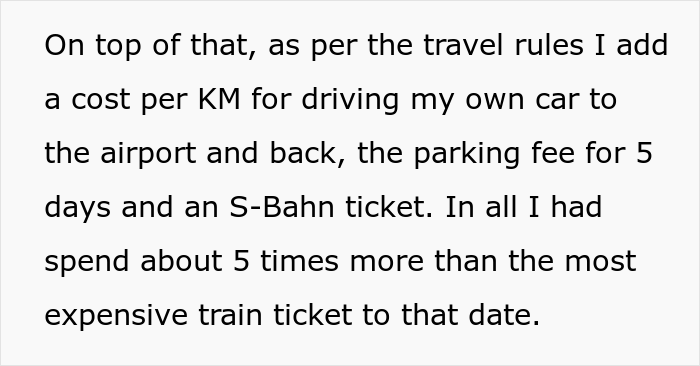


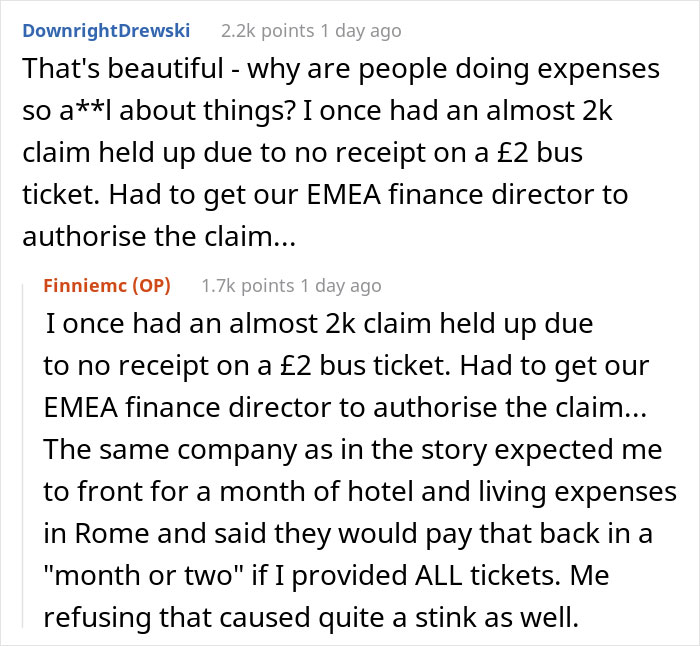


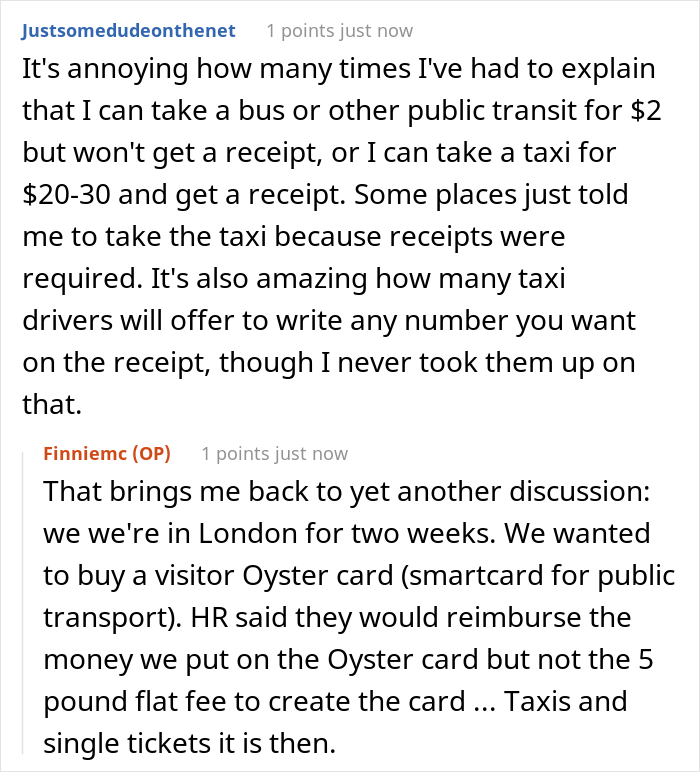
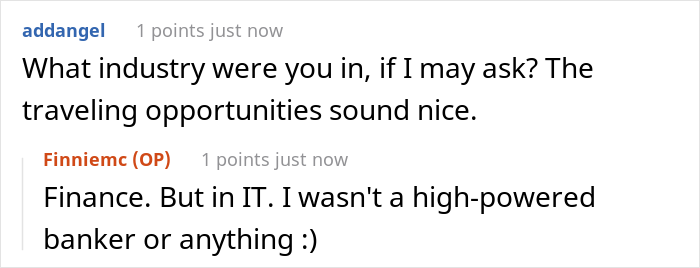
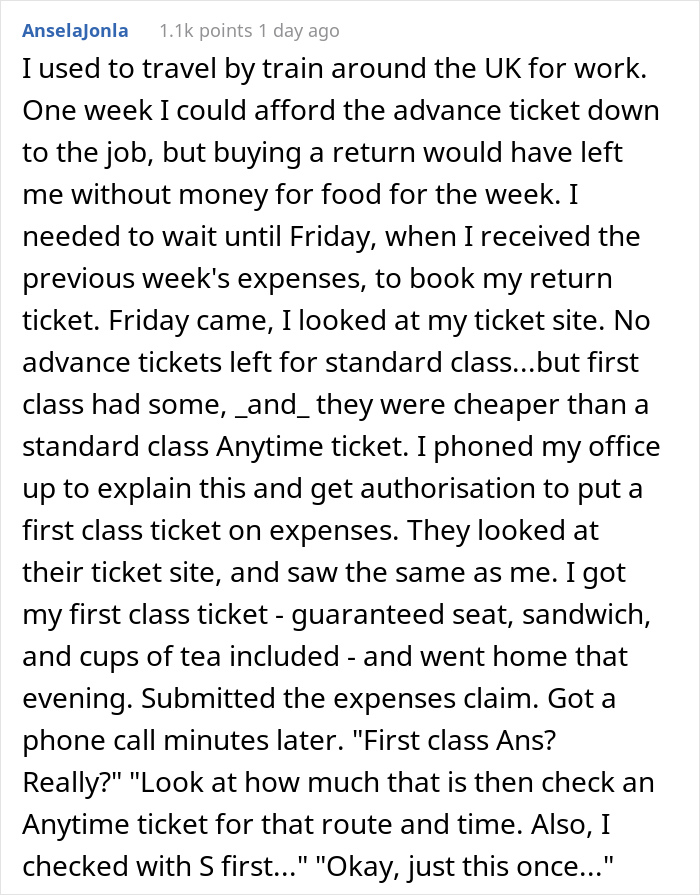
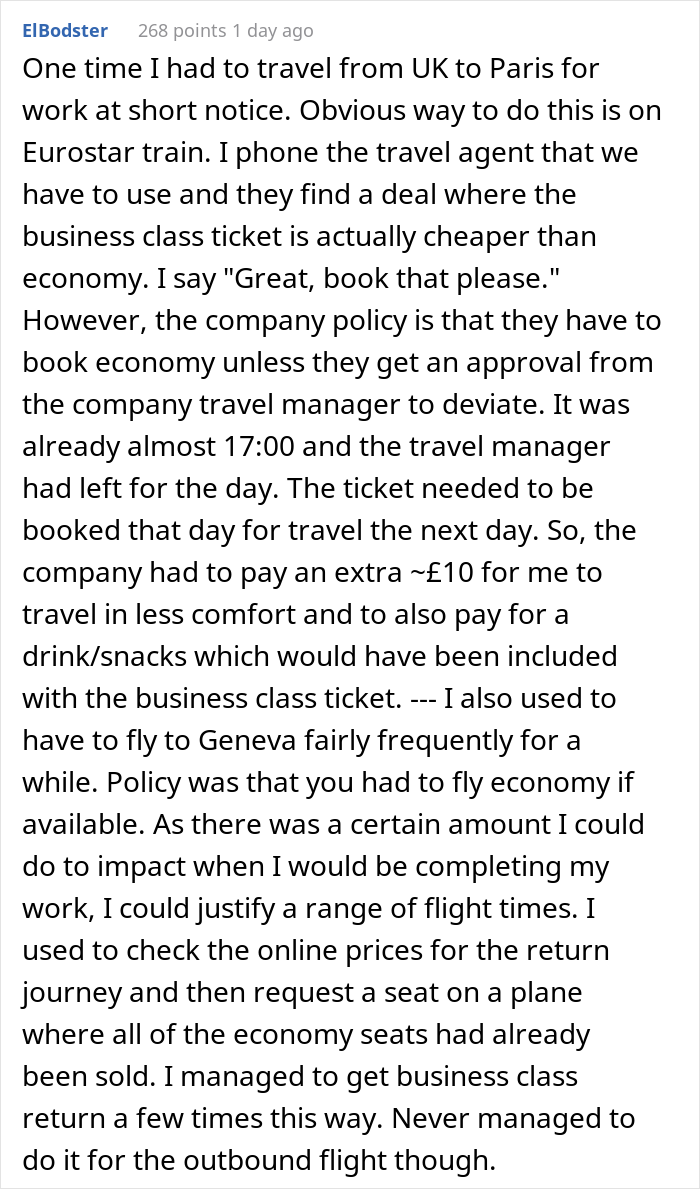

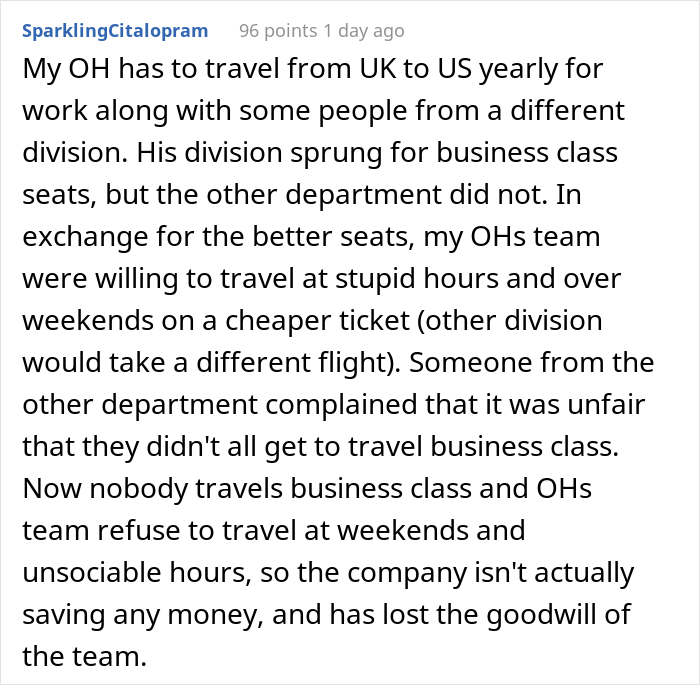
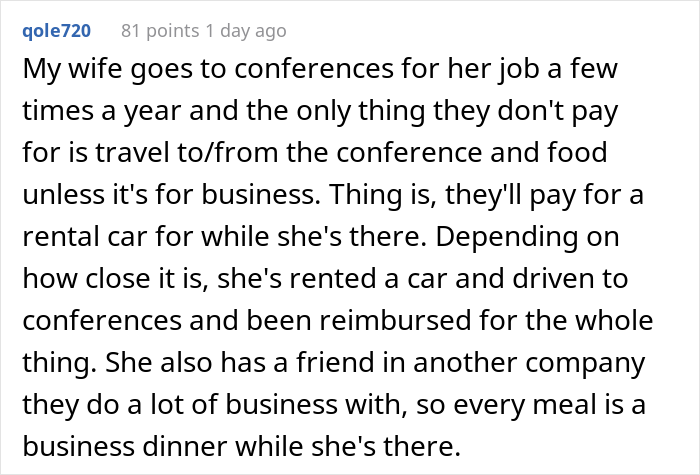


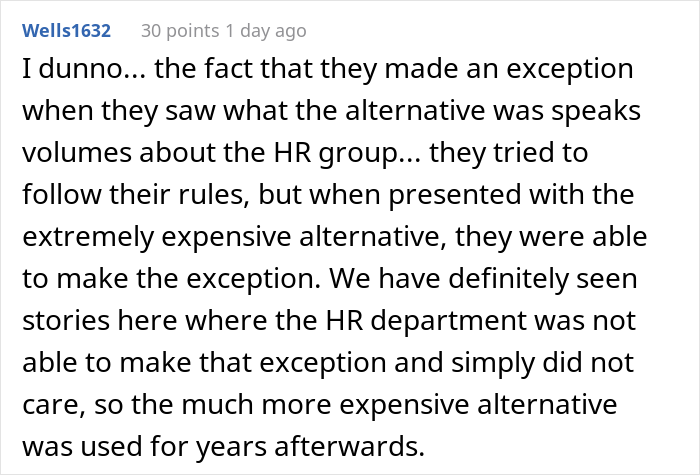






82
22